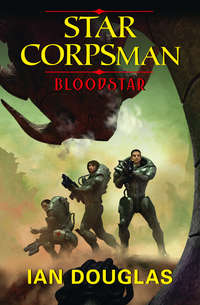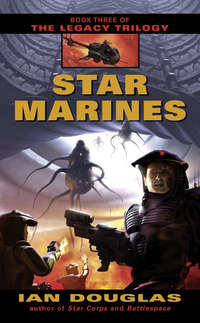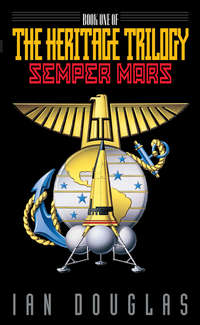
Полная версия
The Complete Heritage Trilogy: Semper Mars, Luna Marine, Europa Strike

Ian Douglas
The Heritage Trilogy Books 1–3

Contents
Cover
Title Page
Semper Mars
Luna Marine
Europa Strike
By Ian Douglas
Copyright
About the Publisher
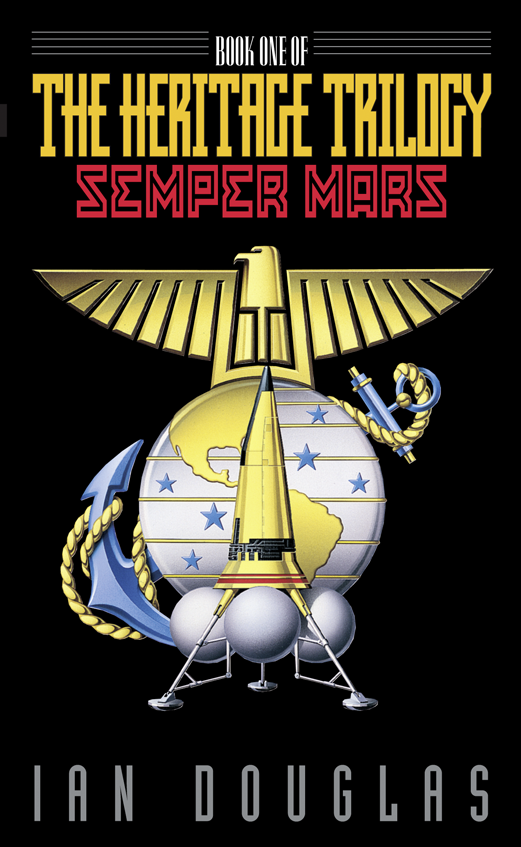
SEMPER MARS
BOOK ONE OF THE HERITAGE TRILOGY
IAN DOUGLAS

Contents
Map
Prologue
“Christ, CJ! You can’t let them do this to us!”
One
This wasn’t the first time the Marines had ventured into…
Two
“How’s it working now?” Garroway asked, slipping into the seat…
Three
Kaitlin Garroway took the second-floor door out of Herb Simon…
Four
Sergeant Gary Bledsoe, USMC, stood at his sandbag-encircled post on…
Five
“Snakebite, this is Basket. Excalibur. I say again, Excalibur.”
Six
“All right, people!” Colonel Lloyd bellowed. “Listen up! We got…
Seven
Kaitlin Garroway peered out the cabin window at a sky…
Eight
“I never thought I’d see the day,” Garroway said, “when…
Nine
The last pale glow of the sunset had long since…
Ten
It was just past midnight, the time of the day…
Eleven
Most of the Marines in the barracks area were asleep.
Twelve
“I talked to Doc Casey,” Garroway told the others at…
Thirteen
“So, you got your lines down?” Garroway asked. It was…
Fourteen
It had been eight days since Kaitlin had seen Yukio,…
Fifteen
According to the data displayed on the seatback screen, the…
Sixteen
It was, Garroway thought, one of the oddest-looking marches in…
Seventeen
Mark Garroway watched his daughter’s face on the Mars cat’s…
Eighteen
The president looked a lot older now than he had…
Nineteen
The Star Eagle Michael E. Thornton, a single-stage-to-orbit SCRAMjet transport,…
Twenty
“So,” Mark Garroway said in what he’d intended to be…
Twenty-One
“Cheyenne Mountain, Shepard,” Colonel Dahlgren said, peering into the telescopic…
Twenty-Two
They’d broken out of the narrow canyon that stretched across…
Twenty-Three
Thirty hours after the MMEF’s triumphant return to Mars Prime,…
Twenty-Four
“Down!” Caswell cried, throwing herself facedown into the sand. “We’re…
Twenty-Five
Kaitlin was on the floor in the den playing chess…
Epilogue
Marine Lieutenant Kaitlin Garroway walked through the automatic doors of…
Map
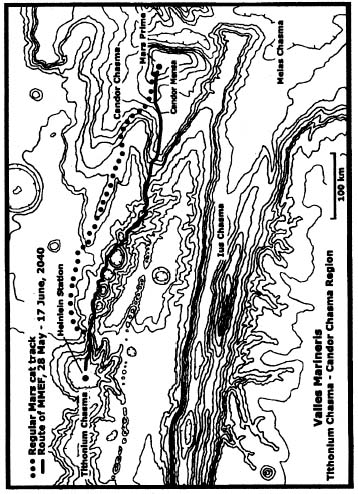
2039
PROLOGUE
MONDAY, 6 JUNE
Office of the Chairman of the
Joint Chiefs of Staff (CJCS)
The Pentagon, Washington, DC
0950 hours EDT
“Christ, CJ! You can’t let them do this to us!”
General Montgomery Warhurst teetered between radically opposing strategies, storming and pleading. The five-star admiral seated behind the broad and brightly polished oak desk before him was not only his commanding officer, but his friend. He and Admiral Charles Jordan Gray went way back. They’d been middies together at the Naval Academy, Warhurst in the Class of ’08, Gray in the Class of ’07. Since their postings to the five-sided squirrel cage, they’d attended one another’s social affairs, had barbecues in each other’s backyards, and shared the same wry disdain for Beltway politics. For them, the old Marine-Navy rivalry was a seal on their friendship, banter and laughing bluster over a couple of beers.
But, by God, Warhurst wasn’t going to let them kill the Corps, wasn’t going to let C. J. Gray kill the Corps, not if he had one thin, ragged breath.
Gray gave him a sad smile. “What’s the matter, Monty? Trying to save your job?”
“That’s not funny. I may be commandant of the United States Marine Corps, but every Marine is a rifleman first. I’d resign in an instant if it would change this. You know that. I’d give my life for the Corps, CJ. I goddamn would.”
The smile vanished. “Jesus, Monty, I know how you feel, but—”
“Do you?” Warhurst gestured at the four-meter flatscreen dominating the wall behind Gray’s desk. The display repeated in hand-high letters the document called up by the admiral’s wrist-top. The words “HR378637: The Unified Military Act” showed at the top of the neatly formatted document in punch-to-the-stomach bold. “The BBs’ve been whittling away at us for years now, cutting our appropriations until we’re damn near running on empty. Now it’s…this.”
Warhurst stopped himself. He was breathing hard, and he could feel the rising flush in his face, feel the blood hammering at his temples. His meds monitor would be kicking in any second now if he kept this up, but, damn it, the BBs—Pentagon slang for “Beltway Bastards”—never failed to raise his blood pressure.
And now they were trying to kill the Corps. His Corps!…
“There’s not a damned thing I can do about it,” the admiral said, shaking his head. His gaze flicked to the left, to the large, 3-D image of a grinning civilian on the wall to his right. “Archy’s backing this thing, and that means it’ll have the president’s approval.”
“Severin is a political hack. He’s also an Internationalist—”
“May I remind you that Archibald Severin is secretary of defense, which makes him our political hack. That means you, me, and the rest of the Joint Chiefs answer to him…and after him the NSC and the president. They pass the word, and we snap to attention, say ‘Yes, sir,’ and politics never rears its ugly face.”
“Everything in Washington is politics, CJ, and that includes the Pentagon and everyone in it. You know that as well as I do.”
“Maybe. But the final word comes from a document you may have heard of: the Constitution, remember? It says we work for the politicians. Not the other way around.”
“I never suggested any different. But this Unified Military Act is political. You know it. I know it. And there’s a political way to fight back.”
“And what might that be?”
“Public opinion.”
The admiral groaned, shifting in his chair. “Jesus, Monty—”
“It’s worked before. Truman? A century ago?” President Harry S Truman, a former artillery officer in the Navy, had come that close to shutting down the Marine Corps in the years immediately after World War II, declaring it to be unnecessary. Public opinion, however—the opinion of Americans who remembered names like Wake, Tarawa, and Iwo Jima—had secured a place for the Corps, by law, in the National Security Act of 1947. And that wasn’t the first time Washington politicians had tried to kill or dismember the Corps. Congress alone had tried it on no fewer than five separate occasions between 1829 and the 1940s.
And each time, public opinion, in one way or another, had played a part in rescuing the Corps from the budget cutters’ hatchets.
“I know that look,” the admiral said. “You’ve got something in mind, or you wouldn’t be in here waving your arms at me.”
Warhurst bent over, picked up the briefcase he’d set on the thick-carpeted floor when he’d entered the CJCS’s office ten minutes before, and set it on Gray’s desk. Touching the lock points, he opened it wide and extracted his PAD, which he slid across the desk, screen up.
Gray picked the thin panel up, his touch awakening the screen. He frowned as he read the document displayed there.
“Mars? You want the Marines to go to…Mars?”
“To safeguard American interests there, CJ. The same way the Marines have safeguarded American interests all over this world.”
Gray touched the turn-page corner of the PAD. “How big an operation is this?”
“The logistics are laid out on page five,” Warhurst said. “I’m suggesting one platoon, twenty-three men. Plus an HQ element. Thirty men in all.”
The admiral paged through several more screens. “Very complete.” He looked up at Warhurst, one white eyebrow askance. “And it’s certainly topical. But you can’t be serious.”
Warhurst reached across the desk and tapped a touch-point on the Personal Access Device. There was a moment while the PAD searched for the office’s network channels, and then the flatscreen behind the admiral’s desk flashed to a new set of uploading images. Gray swiveled in his chair to watch the display, which tinted the room with its ruddy glow.
Red sand and ocher stones littered an uneven, rolling ground as far as the eye could see, beneath a sky gone eerily pink and wan. An American flag hung from a mast in front of a cluster of pressurized domehuts, a tiny symbol of national defiance stirring listlessly in the thin wind. On the horizon, miles away but looming large enough to seem much closer, was the mountain. It reminded Warhurst sharply of Ayers Rock in the Australian outback, monolithic, vast, and red in the distance-chilled sunlight. The surface was sand-polished and smooth, its original angles, planes, and swellings worn down by the wind erosion of five hundred millennia, but the features were still discernible.
Or so some said. There were still voices—and powerful ones, at that—insisting that the so-called Cydonian Face, the Face on Mars, was a natural feature, a kind of cosmic prank elicited by shadows, coincidence, and the irrepressible human will to believe.
This despite the latest reports from Cydonia Base.
“In five more months,” Warhurst said, “Columbus will cycle past Mars and deliver her payload. They used a sealed hab payload, as was their right by the International Space Commerce Treaty…but Intelligence tells us the passengers include fifty soldiers of the Second Demibrigade, Legion Étranger—French Foreign Legion—in the service of the United Nations. That’s more soldiers than we have scientists on Mars, right now…and they’ll be armed, where our people are not.”
Admiral Gray turned away from the flatscreen, scowling. “I needn’t remind you, surely, that the administration is fighting for its life, right now. And trying like the devil to keep a low profile where the UN is concerned.”
“I’m well aware of our current…foreign policy,” he replied. The way he said it added the words lack of in front of the word foreign.
“And how is sending thirty US Marines to Mars supposed to defuse a situation that is just a step or two short of outright war?”
“Maybe it doesn’t,” Warhurst said. “But maybe the president would like an option that doesn’t have us ducking for cover every time some two-bit dictator in South America or Asia sneezes and blames us. Maybe stationing troops on Mars to safeguard our interests—and we’re still allowed to do that, I remind you, under the charter—maybe that would convince Geneva to back off and cut us some slack.”
Gray tapped several touchpoints on the PAD. The image of America’s xenoarcheological station on the bitterly cold and windswept Cydonian plain remained on the wall flatscreen, but Warhurst’s proposal came up on the PAD display. “Hmm. And, just incidentally, it ingratiates the Marines with the American public, eh?”
“Maybe the American public is tired of getting kicked around by those two-bit dictators, too, CJ.”
“Maybe. And maybe Congress won’t want to shut down the Marine Corps while thirty Marines are on their way to protect our people on Mars.” Suddenly, he grinned, a cold and lopsided showing of teeth. “My God. SECDEF and State are going to shit their pants when they see this.” He paused and shook his head. “Damn it, Monty, why the stick up your ass? Maybe Archy and the rest are right, and it’s time to let the Corps retire, with dignity. With honor. Warfare has changed in the last century, you know…or haven’t you been paying attention? Marine amphib ops like Inchon and Tavrichanka are things of the past. We’ll never see a major amphibious landing again, not when satellites and space stations make secrecy impossible in any deployment. Do you want the Corps to end up as nothing more than the Navy’s police force?”
“There are still a few things us Marines do that the other services don’t,” Warhurst replied. He looked down at the desk top for a long moment. “I’ll tell you, though, CJ. The reason, the real reason, doesn’t have that much fact or experience or science behind it. You know I have a son in the Marines. Ted’s planning on making it his career. And his son, my grandson, Jeff. Eleven years old. He commed me just the other day to tell me he was going to be a Marine. Like his daddy. Like me. What the hell am I supposed to tell him, CJ, if they kill the Corps? The tradition? It would be like killing part of who we are.”
Gray sighed. “There aren’t any easy answers, Monty. You know that. The UN is pushing, pushing hard, to reduce all national militaries to a minimum.”
“I’ll let the politicians worry about disarmament,” Warhurst said. “What I don’t want to see is my son’s face…or Jeffie’s, when I have to tell them that the Marines are being shut down, that their country doesn’t need them anymore.”
“A hell of a note,” Gray said, “proving we need them by sending them to Mars.”
“The Marines,” Warhurst replied, “always go where they’re needed.”
2040
ONE
WEDNESDAY, 9 MAY
Cycler Spacecraft Polyakov,
three days from Mars Transfer
1517 hours GMT (shipboard
time)
This wasn’t the first time the Marines had ventured into space, not by a long shot. On February 20, 1962, Colonel John Glenn, United States Marine Corps, had become the first American in orbit, thundering into space atop a primitive Atlas-D booster. Of course, Navy astronauts were quick to point out that Alan Shepard, a former US Navy aviator and test pilot, had been the first American in space nine months earlier, even if his suborbital flight—with a full five minutes in zero G—had also been the shortest spaceflight in history.
Major Mark Alan Garroway did not think of himself as an astronaut, even though he’d been in space for seven months, was drawing astronaut’s flight pay, and was watching now as Mars drifted past the command center’s main viewport. He was a passenger—in effect, he was extremely expensive cargo—aboard the Polyakov, one of four cycler spacecraft set to shuttling between Earth and Mars in the past decade. He was a Marine, and as far as he was concerned, sharing bridge watches with the ship’s three officers—two Russians and an American—did not make him an astronaut. That distinction was reserved for the glory boys and girls of NASA’s Astronaut Corps and the Russkii Kosmonaht Voiska. Marines liked to boast that every Marine was a riflemen first, and that any other job description—whether that of AV-32 pilot or combat engineer, of electronics and computer specialists like Garroway or the goddamn commandant of the whole goddamned Corps—was at best a minor elaboration.
Garroway was still less than enthusiastic about this mission, even after seven months in space. The routine had swiftly become tedious, especially after the magnificence of the blue and cloud-smeared Earth faded to nothing more than a brilliant, blue-white star. It was the sameness of life aboard ship, day in and day out, that ground away at his nerves, convincing him that this time, finally, once and for all, when the mission was done and he got back home, he was going to retire from the Corps at last. That tour-boat concession in the Bahamas was looking better and better with each passing watch. Kaitlin, his daughter, had been accusing him of going soft, lately, in her frequent v-mails. Well, maybe she was right. It was hard to stay gung ho for twenty-five years in a Corps dying of slow starvation…and with nothing much to show for it but a ticket to Mars and a hell of a long tour away from home.
Mark Garroway was the second-highest-ranking officer in the Marine Mars Expeditionary Force, a thirty-man unit comprised of a single, specially assembled weapons platoon on special deployment…very special deployment. General Warhurst himself had put this op together, a last-ditch attempt at saving the US Marines from the Washington compromiser corps. Tradition might dictate that Garroway was a rifleman first, but he rarely thought of himself as such these days. He was forty-four years old and had been in the Corps for almost twenty-five years. A mustang, he’d started out as an enlisted man, an aviation electronics specialist. When he’d re-upped after his first hitch, however, the Marines had paid for him to finish his interrupted tour at college, including stints first at MIT, and later at Carnegie Mellon University in Pittsburgh, and his area of expertise shifted from straight avionics to the obtuse, complex, and frequently highly classified electronics found in military communications, robotics, and AI computer systems. By then, of course, he’d received his commission, and he spent most of the next ten years working on classified programs at half a dozen research labs, from Aberdeen, Maryland, to Sandia, New Mexico, to Osaka, Japan.
His communications electronics expertise was the reason he was a part of the MMEF. Technically, he’d volunteered as a CE Tech for the Marine Mars Expeditionary Force, but no less a Corps luminary than General Montgomery Warhurst had personally requested that he accompany the expedition, and so far as Garroway was concerned, a request by the commandant of the US Marine Corps was a direct order—a politely disguised one, perhaps, but a direct order all the same.
Garroway’s primary responsibility on the mission was to oversee the maintenance of the Marines’ computers and electronic gear—especially the microcomp circuits that controlled their battle armor, commo gear, and assault rifles. Vital work, certainly, but considerably less than a full-time job. If it hadn’t been for the fact that he was also Colonel Lloyd’s executive officer, his second-in-command, Garroway thought he would have gone mad from the boredom by now.
His eyes followed the stately drift of Mars past the control deck’s windows. He still hadn’t accustomed himself to the strangeness, the alienness of the world. At the moment, it looked like a small and seriously diseased orange, its overall yellow-ocher coloration interrupted by patches, streaks, and smears of dark browns and grays. The north polar ice cap was a slender glimmer of sun-dazzled white. That band of black and dark red along the equator was almost certainly the Valles Marineris…the Valley of the Mariner Spacecraft. Despite over a year of study, he could recognize little else in the way of surface features save the polar cap and the three dark smudges of the Tharsis volcanoes.
And then the Polyakov’s slow rotation carried the planet past the edge of the window, and he was looking at stars and emptiness once more.
To his left, Commander Joshua Reiner reached up and tapped one of the monitor displays on the console above his workstation in that annoying way people have of trying to chivvy delicate electronics into proper operation. “Hey, Garroway?”
“Yeah?”
“We got a fault in camera sixty-two. No picture.” Reiner tried upping the gain on a volume control. “No sound, either.”
“Is the thing on?”
“Yup. Readouts say it is, anyway. Must be a loose connection.”
Garroway snorted. Trouble with electronic systems was always dismissed as “a loose connection,” even when the whole system was solid-state, with no wires to come loose in the first place. Pivoting his seat, he took a look over Josh’s shoulder, verifying that the system was on, but without sound or picture.
“Huh. I see what you mean.” The control-deck console was receiving a visual feed, but the screen was black. The sound, though, appeared to have been switched off.
“Storm cellar,” Reiner said, identifying the location of the dead camera. “It’s done this a few times before. Probably nothing major, but we have to log the failure for maintenance, y’know?”
“I’d let it go,” Garroway replied, leaning back in his seat. He was pretty sure he knew what the problem was “See if it fixes itself.”
“Um. Trouble is, old L&M’s on his way up there.”
“Eh? Why? When?”
“He’s logged for…let’s see.” With a few taps on his keyboard, Reiner called up a schedule on one of his monitors. “Here it is. Platoon weapons assembly drill, RSHF, 1530 hours.”
“Oh, shit,” Garroway said, glancing at the digital time readout on a nearby bulkhead. He’d prepared that schedule last week but forgotten that a drill was on for today.
“Yeah. And you never know if he’s gonna want a vid record of the drill.”
“Yeah, roger that.” He pushed back from his console. “I’d better get up there before he does. Cover for me here?”
“You bet.”
Garroway walked across the control deck, ducked low, and stepped through the open hatch into the transport-pod accessway. He moved carefully; spin gravity at the control-deck level was currently only about two-tenths of a G, and a careless move could send him slamming into the overhead.
“L&M” stood for “Lloyd and Master,” the wry sobriquet of Colonel James Andrew Lloyd, the MMEF’s commanding officer. The name was strictly unofficial, of course, used only behind his back by those who had to work with him. Lloyd was a stickler both for regulations and for proper form. His weapons drills aboard the cycler spacecraft had made him notorious; what, the ship’s astronaut crew frequently asked one another in Garroway’s hearing, could possibly be accomplished by drilling Marines in disassembling and reassembling their weapons in zero G? It wasn’t as if they would need to accomplish the feat on Mars, where one-third gravity kept the inner workings of their M-29s conveniently anchored.
Technically, Lloyd held no more authority aboard the cycler than any of the other Marines—or the civilian scientists, for that matter. The ship’s commanding officer was Polkovnik Natalia Filatinova, and she was the one who set the standards by which the men and women in her charge behaved. Nevertheless, old L&M wouldn’t like it if the storm shelter was used for…unofficial activities.
Garroway touched the transport-pod call key mounted on the bulkhead between two lockways. Several moments dragged past, and then he heard the chunk-hiss of a connection being made, and the sealed airtight door swung ponderously open.
A man clambered out, tall and dark-skinned, mustached, clad in a NASA-blue coverall. Two mission patches adorned his left shoulder: the light blue flag of the United Nations, and the circular sword-on-Mars emblem with the letters OEU:AE.
Organisation des Nations unies: Armée de l’Espace. The United Nations’ Space Force.
“Monsieur Colonel Bergerac,” Garroway said, stepping aside to clear a way for him.
“Hello, Major.” The man’s English was perfect, his eyes cold. “Going down? Or up?”
“Up, monsieur.”
“Ah?” He questioned with eyebrows and a cocking of the head.
“An electronic fault. Nothing serious.” Grateful that the French colonel seemed uninterested in pushing the question further, Garroway ducked through the lockway and into the transport pod beyond. A touch of a keypad sealed the lock behind him, and then, he was climbing up one of Polyakov’s three two-hundred-meter arms.



